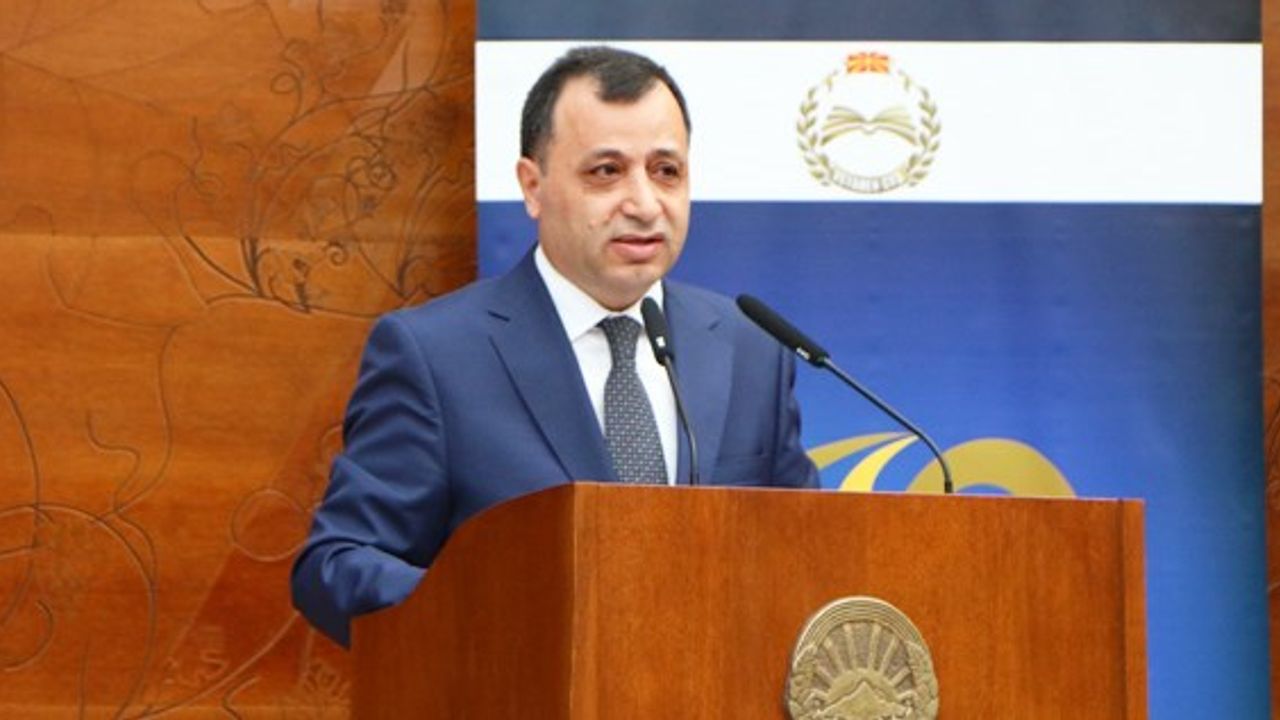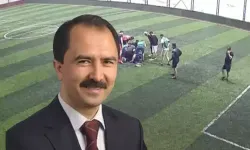Konferans öncesi 14 Mart 2024 tarihinde Uluslararası Balkan Üniversitesi öğrencileri ile bir araya gelen Başkan Arslan “Anayasa Yargısına Neden İhtiyacımız Var?” başlıklı bir konuşma yaptı. Başkan Arslan konuşmasında anayasaların ve anayasa yargısının siyasi iktidarı kontrol etmeye yönelik uzun bir çabanın sonucu olduğunu, yöneticileri etkin bir şekilde kontrol etmek, hak ve özgürlükleri korumak için bir anayasaya ihtiyaç duyulduğunu ifade etti.
Çağdaş medeniyetin en önemli göstergesinin adaleti sağlamak olduğunu vurgulayan Başkan Arslan “Günümüzde adaletin en önemli tezahürü temel hak ve özgürlüklerin etkin bir şekilde korunmasıdır. Anayasal ve yasal düzen ancak adil ise temel hak ve özgürlüklerimizi siyasal ve toplumsal kurumlar nezdinde koruyabilir.” dedi.
Başkan Arslan anayasa mahkemelerinin anayasayı bir toplumsal sözleşme olarak muhafaza etmek ve korumak amacıyla kurulduğunu, bu anlamda yasama ve yürütme işlemlerinin anayasaya uygunluğunu denetlemekle görevli olan anayasa mahkemelerinin veya yüksek mahkemelerin bireylerin anayasa/toplum sözleşmesi tarafından sağlanan hak ve özgürlüklerinin korunmasında önemli bir rol oynadığını belirtti.
Başkan Arslan konuşmasında Türk Anayasa Mahkemesinin hukukun üstünlüğünü, kuvvetler ayrılığını ve insan haklarını, korumadaki temel rolü ve işlevi üzerinde durarak Mahkemenin Türk hukuk sisteminde anayasal ilkelerin başlıca koruyucusu olduğunu ifade etmekten mutluluk duyduğunu dile getirdi. Bireysel başvuru sayesinde Anayasa Mahkemesinin ideolojik ya da devlet eksenli paradigmayı terk ederek hak eksenli hukuk paradigması olarak adlandırdığı paradigmayı benimsediğini belirten Başkan Arslan “Bu yaklaşım, Anayasa'nın temel haklara öncelik verilerek özgürlükler lehine yorumlanmasını esas alır.” dedi ve Anayasa Mahkemesi kararlarından örnekler vererek Mahkemenin adil bir anayasal düzenin kurulması ve sürdürülmesindeki rolüne dikkati çekti.
Başkan Arslan konuşmasının sonunda ölçüsüz siyasi gücü frenlemek, temel hak ve özgürlükleri koruma altına alarak insanların barış içinde bir arada yaşamasını sağlamak için anayasa yargısına ihtiyaç duyulduğunu vurguladı.
Düşünce Özgürlüğü ve Düşünceleri Açıklama Özgürlüğünün Anayasal Yargı Tarafından Korunması Konulu Uluslararası Konferans
Başkan Zühtü Arslan 15 Mart 2024 tarihinde Kuzey Makedonya Cumhuriyeti Anayasa Mahkemesinin 60. kuruluş yıldönümü kapsamında düzenlenen “Düşünce Özgürlüğü ve Düşünceleri Açıklama Özgürlüğünün Anayasal Yargı Tarafından Korunması” konulu uluslararası konferansa katıldı ve “Türk Anayasa Mahkemesi İçtihadında İfade Özgürlüğü” başlıklı bir konuşma yaptı. Konuşmasına düşünen ve konuşan varlıklar olarak kendimizi gerçekleştirmek için ifade özgürlüğüne ihtiyacımız olduğuna dikkati çekerek başlayan Başkan Arslan, bu özgürlüğün tanınmamasının insanın asli doğasını ihlal edeceğini vurguladı.
Başkan Arslan, modern toplumun farklı ve çoğu zaman birbiriyle çatışan yaşam biçimlerinin, fikirlerin ve ideolojilerin bir arada var olmasını gerektirdiğini belirterek ifade özgürlüğünün böylesine çeşitli ve çoğulcu bir toplumu ve siyaseti beslemek ve sürdürmek için etkili bir araç olduğunu dile getirdi. Düşünce ve ifade özgürlüğü hakkını koruma altına almadan felsefi ve siyasi hastalıkları tedavi etmenin mümkün olmadığını vurgulayan Başkan Arslan düşünce ve ifade özgürlüğünün etkin bir şekilde korunması gerektiğine dikkati çekti.
Konuşmasının devamında Türk Anayasa Mahkemesinin ifade özgürlüğünün çoğulcu demokratik bir toplumun temel dayanaklarından birini oluşturduğunu sürekli olarak vurguladığını belirten Başkan Arslan “Anayasa Mahkemesine göre ifade özgürlüğü sadece çoğulcu bir siyasi ve sivil toplum için bir gereklilik değil, aynı zamanda ahlaki aktörler olarak kendimizi gerçekleştirmenin de bir ön koşuludur.” dedi.
Başkan Arslan, Anayasa Mahkemesinin ifade özgürlüğüne ilişkin anayasal hükümleri katı ve ihtiyatlı bir şekilde yorumladığını, uyguladığını belirtti ve sözlerine şöyle devam etti:
“Hem norm denetiminde hem de bireysel başvuruda Mahkeme, anayasal hükümleri özgürlükler lehine yorumlanmasını gerektiren ve benim ‘hak eksenli’ olarak adlandırdığım yaklaşımı benimsemiştir. Hak temelli yaklaşım, özgürlüğün kural, kısıtlamanın ise istisna olduğunu varsaymaktadır. Bu yaklaşım, ‘hak’ kelimesinin birbiriyle ilişkili iki anlamının birleşimini yansıtmaktadır. Birincisi, hepimizin bildiği gibi, ‘hak’ terimi ‘adalet’ veya ‘hakkaniyet’ anlamına gelmektedir. İkincisi, ‘hak’ genellikle, yaşam hakkı ya da mülkiyet hakkı örneğinde olduğu gibi, bir şeyden yararlanmayı ifade eder. Dolayısıyla hak temelli yaklaşımı, anayasal adaleti sağlayarak hakları korumayı amaçlayan bir yaklaşım olarak tanımlayabiliriz.”
Anayasa Mahkemesinin ifade özgürlüğüne getirilen kısıtlamaları değerlendirme yöntemine ilişkin bilgiler veren Başkan Arslan “Mahkeme, ifade özgürlüğüne getirilen kısıtlamaları değerlendirirken Anayasa'nın 13. maddesinde öngörülen üç aşamalı bir test uygulamaktadır. İlk olarak ifade özgürlüğüne kısıtlama getirmek için bir Meclis kararı gereklidir. İkinci olarak söz konusu kısıtlamalar kamu güvenliğinin ve başkalarının hak ve özgürlüklerinin korunması gibi belirli meşru amaçlara hizmet etmelidir. Son olarak ise kısıtlamalar orantılı olmanın yanı sıra demokratik bir toplumda gerekli olmalıdır. Bu bağlamda Mahkeme, bir kısıtlamanın ifade özgürlüğünü ihlal edip etmediğini değerlendirirken, zorunlu toplumsal ihtiyaç ve orantılılık kavramlarını dikkate almaktadır.” dedi ve Anayasa Mahkemesi kararlarından örnekler vererek bu testlerin Anayasa Mahkemesi içtihadında nasıl uygulandığını açıkladı.
Başkan Arslan konuşmasının sonunda Anayasa Mahkemesinin demokratik bir toplumun ayırt edici özellikleri olan hoşgörü, çoğulculuk ve açık fikirlilik değerlerinin korunmasında önemli bir rol oynadığını ifade ederek anayasal demokrasinin vazgeçilmez kurumları olan anayasa mahkemelerinin düşünce ve ifade özgürlüğünü korumaya devam edeceğine inandığını dile getirdi.
---
Başkan Arslan'ın Kuzey Makedonya Cumhuriyeti Anayasa Mahkemesinin 60. kuruluş yıldönümü kapsamında düzenlenen uluslararası konferansta yaptığı konuşmaya şöyle;
Freedom of Expression in the Case-Law of the Turkish Constitutional Court *
Zühtü Arslan**
Distinguished Participants,
Ladies and Gentlemen,
It is a great pleasure to be here and address such eminent participants.
I would like to thank the President of the Constitutional Court of North Macedonia for kindly inviting us and hosting this conference.
I would like to begin my brief speech with a simple conceptual question: “Why do we need freedom of thought and expression?”
In order to answer this question properly we have to understand the true nature of human being and society. The act of thinking and speaking lies at the heart of human existence. Human beings cannot be conceived without the acts of thinking and speaking.
Mevlâna Jalaluddin Rumî considered thinking as the essence of a human being. He states: "man consists of thought, and the rest is nothing but flesh and bone".1 As thinking and speaking beings, we need freedom of expression to realise ourselves. The denial of this freedom will therefore infringe the essential nature of human beings.
Of course, thought does not make any sense if it is confined to the human mind. What really matters is to be able to reflect this thought and express it. Again, Mevlâna defines freedom of expression in an almost absolute manner. He says: “if you are not a slave, address as a sultan, express your opinions in whatever way you like”.2
The nature of society also requires us to enjoy freedom of thought and expression. It is a very well-known fact that we live in a diverse society in terms of nationality, ethnicity, religion, ideology, lifestyle and so on. “All human activities”, as Hannah Arendt put it eloquently, “are conditioned by the fact of human plurality, that not one man, but men in the plural inhabit the earth and in one way or another live together”.3
Since modern society is inevitably pluralist, it requires the co-existence of different and often conflicting ways of life, ideas and ideologies. Freedom of expression is an effective instrument for nurturing and maintaining such a diverse and plural society and politics. Wittgenstein, a leading linguistic philosopher of the last century, emphasised the importance of a pluralistic way of thinking by stating that “A main cause of philosophical disease- a one-sided diet: one nourishes one’s thinking with only one kind of example”.4
It is impossible to cure philosophical and political diseases without protecting the right to freedom of thought and expression. That is why we need to effectively protect the freedom of thought and expression.
Distinguished Participants,
The Constitutional Court of Türkiye (the Court) has consistently pointed out that the freedom of expression constitutes one of the basic pillars of a plural democratic society. For the Court, the freedom of expression is necessary not only for a pluralist political and civil society, but also a precondition of realising ourselves as moral agents.5
Bearing in mind this crucial role, the Court has interpreted and applied the constitutional provisions concerning freedom of expression in a strict and vigilant manner. In both areas of constitutionality review and individual application, the Court has adopted what I call “a right(s) based” paradigm which requires us to interpret the constitutional provisions in favour of freedoms. The rights-based paradigm assumes that freedom is the rule and restriction is the exception.
This paradigm reflects the combination of two interrelated meanings of the word “right”. First, as we all know, the term “right” means “justice” or “fairness”. Second, “right” usually refers to the enjoyment of something, as in the example of the right to life, or right to property. So, we can define the rights-based paradigm as the one that aims to protect rights by ensuring constitutional justice.
The Court applies a three-level test provided by Article 13 of the Constitution in evaluating the restrictions on the freedom of expression. First of all, an act of parliament is necessary to impose restrictions on the freedom of expression. Secondly, the restrictions must pursue certain legitimate aims such as the protection of public security and the rights and liberties of others. Finally, the restrictions must be proportionate and necessary in a democratic society. In this regard, following the footsteps of the European Court of Human Rights, the Court has invoked the conceptions of “pressing social need” and “proportionality” in deciding whether an impugned restriction constitutes a violation of the freedom of expression.
The Constitutional Court makes it clear that the existence of a formal act of parliament is not sufficient to restrict freedom of expression. The law must also meet substantive qualifications such as clarity, certainty and foreseeability. Furthermore, the law must contain certain safeguards for freedom of expression against arbitrary interference by public authorities.
Let me give you a few examples of how these tests are applied in the case-law of the Constitutional Court.
In its early judgments concerning Twitter and Youtube, the Court found a violation of the freedom of expression on the ground that a blanket ban on these platforms was not compatible with the law and that the relevant provision of the Law on Internet failed to meet the requirement of legality.6 The Court later annulled that legal provision on the same basis in a concrete norm review case.7
In many other cases, the Constitutional Court has also found a violation of freedom of expression and press on the basis that the relevant legal provisions (Article 8/A and 9 of the Law on Internet) do not provide the basic guarantees capable of preventing arbitrary behaviour of the public authorities and ensuring a fair balance between freedom of expression and the legitimate right of a democratic society to protect itself against threats like terrorist activities.8
Apart from the principle of legality, the Court has frequently applied the criteria of “necessary in a democratic society” in its judgments. For instance, in the Wikimedia Foundation case, where the access to Wikipedia was blocked due to the contents available on two URL addresses, the Court pointed out that the blocking of access to Wikipedia in Türkiye was an interference not only with the freedom to disseminate information and thoughts enjoyed by the applicant in its capacity as the content provider but also with the Turkish users’ right to receive information and thoughts. Having considered the permanent nature of this blanket ban on access to the entire website, the Court reached the conclusion that such restriction on freedom of expression was disproportionate and incompatible with the requirements of a democratic society. 9
Similarly, in a constitutionality review case, the Court has annulled the provision allowing for the imposition of a disciplinary sanction on the law-enforcement officers for directing criticism, either orally or in written form, towards the acts and actions of their superiors during office. The Court held that the contested provision punishes all kind of unfavourable criticisms directed towards the superiors without determining whether it has damaged the superiors’ authority and has involved any element damaging the hierarchical order or functioning of the agency. In this sense, the Court declared that the restriction imposed on the freedom of expression is not compatible with the requirements of a democratic society.10
Distinguished Participants,
I would like to conclude my speech by saying that all these judgments and many others clearly reveal that the Constitutional Court of Türkiye has provided an immense and invaluable contribution to the protection of freedom of thought and expression. By doing so, the Court also plays a crucial role in maintaining the values of toleration, pluralism and open-mindedness, which are the distinctive features of a democratic society.
I sincerely believe and hope that the constitutional courts, as indispensable institutions of constitutional democracy, will continue to protect the freedom of thought and expression.
Thank you for your attention.
| Prof. Dr. Zühtü ARSLAN |
| President |
| Constitutional Court of the Republic of Türkiye |
-----------------
* The Speech delivered at the International Conference on “Constitutional-Judicial Protection of the Freedom of Thought and Public Expression of Thought”, Skopje, North Macedonia, 15 March 2024.
** The President of the Constitutional Court of Türkiye.
1 See Ergin Ergül, Rumi: A Guide for Universal Justice and Peace, (Ankara, 2017), p.58-59.
2 Cited in Ergül, Rumi, p.63.
3 Hannah Arendt, The Freedom to be Free, (Milton Keynes: Penguin Books, 2020), p. 26.
4 Ludwig Wittgenstein, Philosophical Investigations, trans. G.E.M. Anscombe, (Oxford: Basil Blackwell, 1958), §593, p. 155.
5 Bekir Coşkun [Plenary], App. no: 2014/12151, 4 June 2015, §§ 34-35. For the same approach in the field of constitutionality review see Constitutional Court’s decision, Е.2017/162, K.2018/100, 17 December 2018, § 109; Constitutional Court’s decision, E.2022/129, K.2023/189, 08 November 2023, § 11.
6 See Yaman Akdeniz and Others, App. no: 2014/3986, 2 April 2014, § 49; Youtube LLC Corporation Service Company and Others [Plenary], App. no: 2014/4705, 29 May 2014, §§ 56-57.
7 See Constitutional Court’s decision, E.2015/76, K.2017/153, 15 November 2017, §§ 31-33.
8 See Keskin Kalem Yayıncılık ve Ticaret A.Ş. ve diğerleri [Plenary], App. no: 2018/14884, 27 October 2021; Abdullah Kaya and Others, App. no: 2016/1430, 22 November 2023; Artı Media Ltd. [Plenary], App. no: 2019/40078, 14 September 2023; Ahmet Alphan Sabancı and Others, App. no: 2015/13667, 21 November 2023.
9 See Wikimedia Foundation Inc. and Others [Plenary], App. no: 2017/22355, 26 December 2019.
10 See Constitutional Court’s decision, E.2021/22, K.2022/6, 26 January 2021.
---
Başkan Arslan'ın Uluslararası Balkan Üniversitesinde yaptığı konuşma şöyle;
Why Do We Need Constitutional Justice?*
Zühtü Arslan**
Distinguished Participants,
Ladies and Gentlemen,
It is a great pleasure to be here again and to address such eminent participants.
I remember almost six years ago I talked here about the past, present and future of constitutional justice in Türkiye.
The topic of today’s speech is encapsulated in a simple but a crucial question: “Why do we need constitutional justice?” We have to raise further questions as to the nature of “constitution” and “justice” in order to answer properly the question on the necessity of constitutional justice.
After repliying these conceptual questions, I will briefly talk about the role and function of the constitutional justice in Türkiye.
1. Why Do We Need a Constitution?
Let me start with the first crucial question: why do we need a constitution? The reply to this question requires us to grasp the nature and main characteristics of power itself.
The power may be defined as the ability to decide on certain issues and enforce and impose one’s will over others. In this regard, legal and political power lies in the will to create, apply and impose rules on the people.
History reveals that the necessity for controlling the power of the rulers started as soon as the division between the governor and governed emerged. As the British historian Lord Acton put it eloquently “power tends to corrupt and absolute power tends to corrupt absolutely”. This nature of power made it necessary to seek for the ways of limiting the holders of power.
The origins of the desire for controlling the power may be traced back to the Epic of Gilgamesh, known as the first written text of literature. This epic tells us the story of how the gods found the way of controlling King Gilgamesh, who oppressed the people of Uruk, an ancient city founded in the territories of today’s Irak.
Upon the begging of the oppressed people, Gods created a powerful rival named Enkidu and declared that “let them [Enkidu and Gilgamesh] vie (compete) with each other, so Uruk may be rested!”1
However, the project of terminating the tyranny of Gilgamesh ended up in failure when Enkidu became the King's best friend. In today's world we still seek to resolve what is called the "Gilgamesh problem", that is how to control the political authority.2
This ancient epic also reveals that controlling power is indispensable for the protection of rights and liberties of human beings. Ibn Khaldun, who is known as the founder of sociology, emphasised that human rights should be protected for the continued existence of the society and the state.
The concept used by Ibn Khaldun in his Muqaddimah was "hukuk-en- nas" ("the rights of human beings"). Ibn Khaldun expresses the denial and violation of the rights with the word "zulm", that means "oppression". According to Ibn Khaldun, oppression leads to the destruction of the civilization (umran) and consequently impairs the state in the last instance.
More importantly, Ibn Khaldun states that the rights of human beings should be safeguarded in judicial field and that the responsibility in this regard rests with the judge.
It wouldn't be wrong to say that constitutions and constitutional justice are the culmination of the long process of striving to control the political power. In other words, we need a constitution to effectively control the rulers and protect our rights and freedoms.
There are two constitutional principles which serve to establish constitutional state in which power is limited and rights are protected. First is the principle of rule of law that aims to ensure the primacy and supremacy of law. Contrary to the arbitrary rule of man, the rule of law requires that the rulers must also be subjected to law.
Almost all modern constitutions guarantee constitutional principle of the rule of law. For instance, Article 8 of the Constitution of North Macedonia enumarets “the rule of law” as one of the fundamental values of the constitutional order. Likewise, Article 2 of the Turkish Constitution stipulates that the Republic of Türkiye is a state based on the rule of law.
The rule of law is clearly the most frequently used and referred constitutional principle in the case-law of the Constitutional Court of Türkiye (the Court). Based on the judgments of the Court, a democratic state of law may be defined as a state where the political power is restricted to protect fundamental rights and freedoms, and the rulers, as well as the governed, are bound by the rule of law.
The second principle of constitutional state is the separation of powers. The historical experience has proved that there is no liberty unless the powers of legislature, executive and judiciary are separated from each other and vested with different organs. As Spinoza warned us “to entrust affairs of state absolutely to any man is quite incompatible with the maintenance of liberty”.3
Like the rule of law, the principle of separation of powers is a sine qua non condition of modern constitutions. Again Article 8 of the North Macedonian Constitution mentions “the division of state powers into legislative, executive and judicial” as one of the foundational values of the constitutional order of the state. Article 16 of the Declaration of the Rights of Man and of the Citizen (1789), which is part and parcel of the French Constitution, went even further by stating that “Any society in which no provision is made for the separation of powers, has no constitution.”
The Preamble of the Turkish Constitution provides that the separation of powers does not imply supremacy or superiority among the relevant bodies of the state but a “civilized cooperation” and division of functions. The Constitutional Court of Türkiye has interpreted the separation of powers as a vital safeguard for the independent judiciary.4
Distinguished Participants,
So far, I have tried to answer basic questions as to the nature and necessity of the constitutions. Now I would like to turn to the second relevant question of “Why do we need justice?”
2. Why Do We Need Justice?
Undoubtedly, the most significant indicator of the contemporary civilization is to secure justice. To borrow the words of the great Kazakh poet and thinker Abay we can say that “justice is the mother of all virtues.”5
This value has played a significant role in the lives of states and societies. At this point, I would like to mention a concept called the “circle of justice” (“daire-i adalet”), a principle that dominated over the legal and political order of the Ottoman State. The circle of justice amounts to certain elements of the state such as army, people, treasury, and justice. It is formulated and summurised as follows: “No power without troops,/ No troops without money,/ No money without prosperity,/ No prosperity without justice and good administration.”6
This reveals that the success of all the elements of a powerful state is ultimately dependant on the value of justice. That is why justice, as the foundation of any social and political entity, maintains order and ensures happiness of the people.7
What is justice then? Perhaps one of the most comprehensive definitions of justice was provided by Mevlâna Celaleddin Rumî. For Rumî, justice requires that “everything must be put in its proper place”. In fact Rumî replied the question “what is justice” in a concrete way: “Justice is giving water to trees”. However, it is injustice “to give water to thorns”.8
Mevlâna emphasised the role of law and justice in resolving conflicts among people in a peaceful way. Therefore, he regarded the judge, who applied the law to resolve conflicts, as “a mercy (bestowed by God) and the means of removing strife”. He said that judge was “a drop from the ocean of the justice of the Resurrection”.9
This definition and function of justice given by Rumî is still relevant today. We need law to solve our problems without killing each other, and also justice to put everything in its right place. In today’s political language, justice also refers to the protection and promotion of rights and liberties of individuals. Nowadays, the most significant manifestation of justice is the effective protection of the fundamental rights and freedoms. Only a just constitutional and legal order can protect our basic rights and liberties vis-a via the political and social institutions.
3. Why Do We Need Guardians for the Constitution and Justice?
As we all know, constitutions are also described as social contracts by which people set down the conditions for living together. If there is a contract, there must also be certain guarantees to protect it against violations of its terms. This is so because any contract requires a body or bodies to guard its terms and provisions against possible encroachments.
There is no doubt that constitutional courts were established with the objective of preserving and protecting the constitution as a social contract. In this sense, the constitutional or supreme courts, charged with the review of constitutionality of legislative and executive acts, play a significant role in protecting the rights and liberties of individuals, which are provided by the constitution/social contract.
In short, behind the constitutional justice lies a widespread belief that the constitutional courts are the best organs to guard the constitution. In fact, this view is a result of a very long and heated debate among scholars as well as constitution making powers.
The idea of judicial review by a centralised constitutional court emerged from a fierce debate among two leading lawyers, namely Kelsen and Schmitt. They both tried to provide a convincing answer to the following question: "Who is the best guardian of the Constitution?'
Kelsen defended the idea that judges of a centralised constitutional court were in a better position to protect the constitution and its values. Schmitt disagreed by citing the analogy made by an MP at the constitutional committee of the Weimar parliament. For Schmitt, creating a special court to review the constitutionality of law was not different from making "the fox as the guardian of hen-house".10
Following the gross violations of human rights before and during the Second World War, Kelsen's argument prevailed not only in Europe but also in most parts of the world. Indeed, irrespective of whether this argument is convincing or not, a centralised constitutional adjudication is widely adopted as an effective way of controlling the legislative and executive powers.
4. Why Do We Need a Constitutional Court in Türkiye?
Distinguished Participants,
Ladies and Gentlemen,
In the last part of my lecture, I would like to talk briefly about the main role and function of the Turkish Constitutional Court in upholding the values and principles of rule of law, separation of powers and human rights.
I would be happy to say that the Court has become the main guardian of the constitutional principles in Turkish legal system. This role of guardianship is more visible in its decisions and judgments concerning the protection of rights and liberties of individuals.
There are two legal ways to protect constitutional rights and liberties in Turkish constitutional system. First is the constitutional review of laws and presidental decrees. From the very beginning of the establishment of the Constitutional Court in 1962, the Turkish Constitution has controlled the constitutionality of laws and decree laws (presidential decrees, since 2017) through the exception of unconstitutionality and annulment action.
The second constitutional tool to protect fundamental rights is called individual application or constitutional complaint, which provides individuals with the chance to have direct access to constitutional justice.
It wouldn’t be an exaggeration to say that with the help of individual application, the Constitutional Court has abandoned its deeply embedded ideological or state-based paradigm and instead adopted what I call a rights-based legal paradigm. The rights-based paradigm assumes that freedom is the rule, and restriction is the exception. This approach requires that the Constitution be interpreted in favour of freedoms by giving priority to fundamental rights.
Indeed, in many judgments on individual application, the Court has emphasised that the rights-based approach must dominate the constitutional justice. According to the Court, constitutional provisions “can fully fulfil their functions if they are interpreted in the context of the development of pluralist democracy and in a rights-based manner.”11
The paradigm shift in the jurisprudence of the Court can be clearly seen in its approach to the headscarf issue. In Türkiye, as the case in some part of Europe, intense discussions had taken place on the constitutionality of headscarf ban in universities and public spheres.
Before adopting the rights-based paradigm, the Court even annulled the constitutional amendments which were enacted to abolish the headscarf ban in universities. The Court ruled that the amendments contravened the constitutional principle of secularism, which is enshrined as an eternal clause under Article 2 of the Constitution.12
However, with the adoption of the rights-based paradigm, the Court has radically changed its interpretation of the principle of secularism. In 2014, the Constitutional Court examined a case of individual application which concerned a female lawyer’s expulsion from a courtroom for wearing headscarf. The trial judge had decided that the lawyer’s presence in the hearing with her headscarf was contrary to the principle of secularism under the case-law of the Court and the European Court of Human Rights.
The Constitutional Court held that the interference with the applicant’s freedom of religion did not meet the constitutional requirement of “lawfulness”. This was because there was no law preventing any lawyer from wearing headscarf at courtrooms. The Court also stated that no reasonable and objective basis was presented for preventing the applicant from taking part at the courtroom by wearing headscarf for her religious convictions. Therefore, the principle of non-discrimination was violated since the applicant was put in a disadvantageous situation compared to those female lawyers not wearing headscarf.13
With so many judgments like this, which resolved the chronicle legal disputes, the Court has provided an immense and invaluable contribution to the establishment and maintenance of a just constitutional order. The richness and diversity of this contribution can be seen in the bulk of the judgments of the Court in the field of both constitutionality review and indiviual application.
Distinguished Participants,
Conclusion
To conclude my speech, I would say that we need constitutional justice for two main reasons. First, from the very beginning, history has revealed that the power tends to corrupt, therefore it must be restricted by law and constitution. It is also widely believed that the constitutional courts are in a better position to restrict political power by upholding the constitutions. As such they are regarded as the indispensible institutions of constititutional democracies.
The second reason is related to the pluralistic nature of society. It is a fact that we live in a diverse society. Constitutions as social contracts cannot be silent against, or remain indifferent to, the fact of diversity. In this sense, constitutional justice, through its function of protecting basic constitutional values, contributes significantly to the peaceful coexistence of individuals in a given society.
In a nutshell, we need constitutional justice to curb the excessive political power, and maintain peaceful coexistence of people by protecting fundamental rights and liberties.
With these two functions, constitutional courts make a great deal of contribution to appeasing social tension and sustaining social peace.
Thank you for your kind attention.
| Prof. Dr. Zühtü ARSLAN |
| President |
| Constitutional Court of the Republic of Türkiye |
-----------------
* Lecture delivered at the International Balkan University, Skopje, 14 March 2024.
** President of the Constitutional Court of Türkiye.
1 The Epic of Gilgamesh, trans. A. George, (London: Penguin Books, 1999), p. 5.
2 Daron Acemoglu and James A. Robinson, The Narrow Corridor: States, Societies, and the Fate of Liberty, (New York: Penguin Press, 2019), p. xiv.
3 Benedict de Spinoza, A Theologico-Political Treatise and A Political Treatise, trans. R.H. Elves, (NewYork: Dover Publications, 1951), Chapter VII, § 29, p. 342.
4 The Court’s decision, E.2014/57, K.2014/81, 10 April 2014.
5 Abay (İbrahim Kunanbayev), trans. E.Ayan and Z.Kibar, (İstanbul: Türk Edebiyatı Vakfı, 2020), p. 482.
6 See Linda T. Darling, A History of Social Justice and Political Power in the Middle East: The Circle of Justice from Mesopotamia to Globalization, (London: Routledge, 2013), p.2.
7 Ibid., p.3.
8 Mevlâna Jalâlu’ddîn Rûmî, The Mathnawî, Volume II, trans. R. A. Nicholson, (Konya. Konya Metropolitan Municipality Book, 2010), Book V, § 1090, p.277.
9 Rûmî, The Mathnawî, Volume II, Book VI, § 1495, p.517.
10 See Lars Vinx, The Guardian of the Constitution: Hans Kelsen and Carl Schmitt on the Limits of Constitutional Law, (Cambridge: Cambridge University Press, 2015), pp.90-91.
11 See, Ömer Faruk Gergerlioğlu [Plenary], App. No. 2019/10634, 1 July 2021, § 133; and also, Ali Kuş [Plenary], App. No. 2017/27822, 10 February 2022, § 50.
12 The Court’s decision, no. E. 2008/16, K. 2008/116, 5 June 2008.
13 See Tuğba Arslan [Plenary], App. No. 2014/256, 25 June 2014, §§ 98-99, 153. See also, B.S., App. No. 2015/8491, 18 July 2018 for dismissal from public office of a female civil servant for wearing headscarf.









